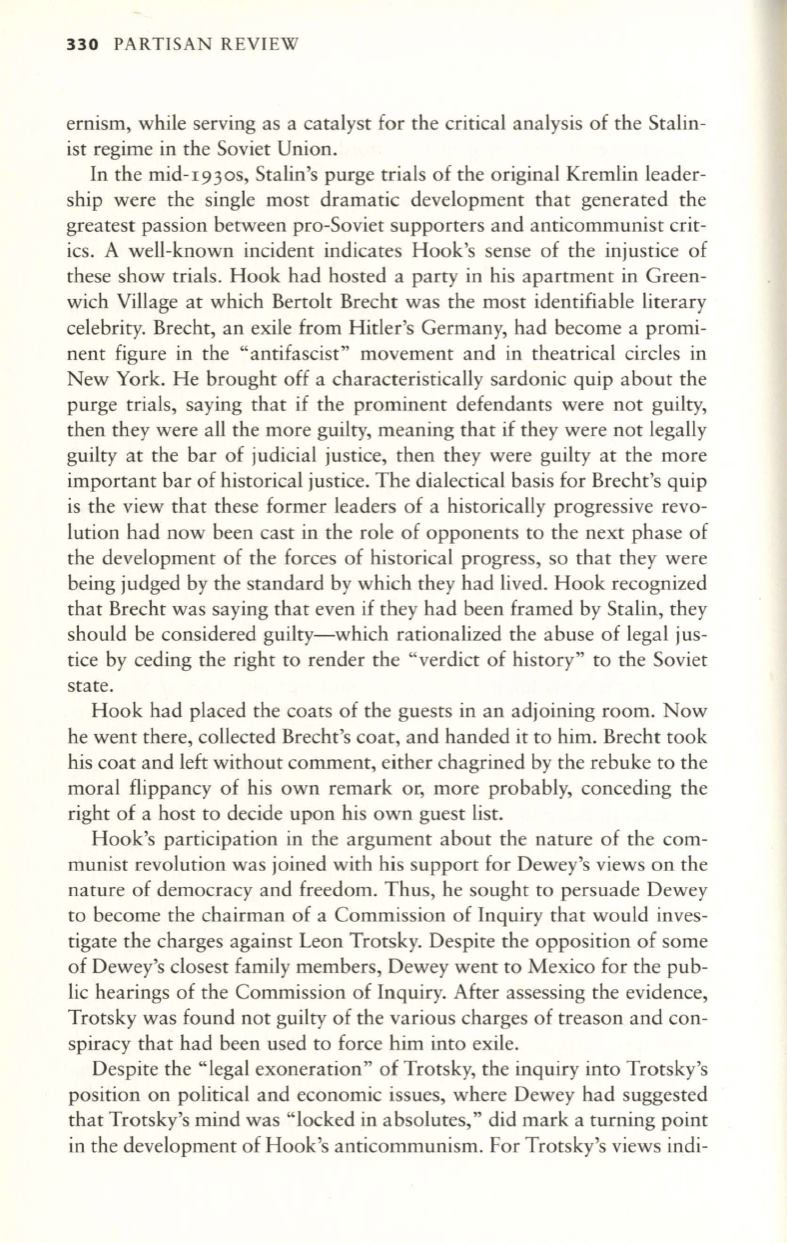
330
PARTISAN REVIEW
ernism, while serving as a catalyst for the critical analysis of the Stalin–
ist regime in the Soviet Union.
In
the mid-I930S, Stalin's purge trials of the original Kremlin leader–
ship were the single most dramatic development that generated the
greatest passion between pro-Soviet supporters and anticommunist crit–
ics. A well-known incident indicates Hook's sense of the injustice of
these show trials. Hook had hosted a party in his apartment in Green–
wich Village at which Bertolt Brecht was the most identifiable literary
celebrity. Brecht, an exile from Hitler's Germany, had become a promi–
nent figure in the "antifascist" movement and in theatrical circles in
New York. He brought off a characteristically sardonic quip about the
purge trials, saying that if the prominent defendants were not guilty,
then they were all the more guilty, meaning that if they were not legally
guilty at the bar of judicial justice, then they were guilty at the more
important bar of historical justice. The dialectical basis for Brecht's quip
is the view that these former leaders of a historically progressive revo–
lution had now been cast in the role of opponents
to
the next phase of
the development of the forces of historical progress, so that they were
being judged by the standard by which they had lived. Hook recognized
that Brecht was saying that even if they had been framed by Stalin, they
should be considered guilty-which rationalized the abuse of legal jus–
tice by ceding the right to render the "verdict of history" to the Soviet
state.
Hook had placed the coats of the guests in an adjoining room. Now
he went there, collected Brecht's coat, and handed it to him. Brecht took
his coat and left without comment, either chagrined by the rebuke to the
moral flippancy of his own remark or, more probably, conceding the
right of a host to decide upon his own guest list.
Hook's participation in the argument about the nature of the com–
munist revolution was joined with his support for Dewey's views on the
nature of democracy and freedom. Thus, he sought
to
persuade Dewey
to become the chairman of a Commission of Inquiry that would inves–
tigate the charges against Leon Trotsky. Despite the opposition of some
of Dewey's closest family members, Dewey went
to
Mexico for the pub–
lic hearings of the Commission of Inquiry. After assessing the evidence,
Trotsky was found not guilty of the various charges of treason and con–
spiracy that had been used to force him into exile.
Despite the "legal exoneration" of Trotsky, the inquiry into Trotsky's
position on political and economic issues, where Dewey had suggested
that Trotsky's mind was "locked in absolutes," did mark a turning point
in the development of Hook's anticommunism. For Trotsky's views indi-


